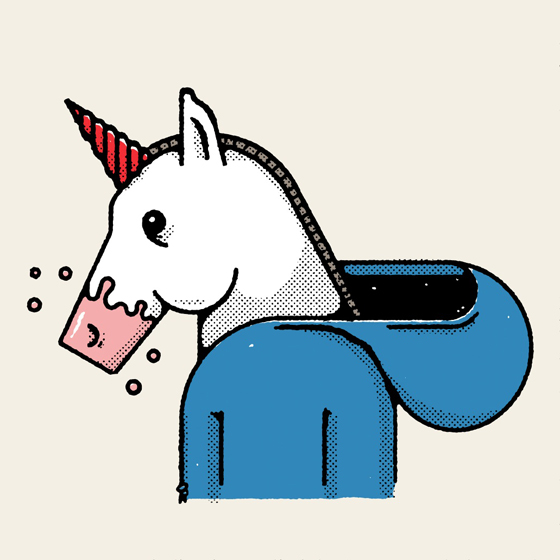科技泡沫無人再提,獨角獸不用再逃了
|
我們在2015年底開始做這個專欄,當時的科技熱潮讓人覺得它有崩潰的危險。共同基金和機構投資者向大型高價值私營初創公司撒錢,從而創造出了所謂的獨角獸時代;隨后,由于下錯注而受傷的投資者突然開始撤離。估值下調、收入未達到預期、現金捉襟見肘以及收購失敗的消息給這門炙手可熱的生意潑了冷水。所有人都停了下來,然后問道:“是不是出現科技泡沫了?”——這幾年投資者一直在探討這個問題,也一直對此感到擔心。但沒有什么東西真的破滅,那種泡沫感也已不復存在。 近三年時間過去了,我們的專欄也做了27期,科技泡沫問題已經不再重要。在繁榮發展的領域中,有更多的問題需要擔心。有害的性別歧視和性騷擾文化走上了前臺并占據了中心位置,這要感謝越來越多的警示者。初創企業的卑劣行為引起高度關注,從而讓這個行業對“假裝成功,直到真的成功”的強行成功哲學產生了疑問。作為世界上最有價值的風投支持型初創公司,優步一直是運轉失靈的鮮活例子,它的董事會、聯合創始人以及投資者在媒體上互放黑槍,并通過打官司來爭奪公司控制權。2017年,初創行業感受到了這幾年不惜代價的唯增長論留下的后遺癥。 |
When we started this column in late 2015, the technology boom felt like it was in danger of collapse. Mutual funds and institutional investors had created the so-called Age of Unicorns by pouring money into large, highly valued private startups; suddenly investors were in retreat, burned by bad bets. Talk of valuation markdowns, missed revenue targets, cash crunches, and failed acquisitions threw cold water onto a blistering business. Everyone stopped asking the question investors had been debating and fretting over for the past few years: “Are we in a tech bubble?” Nothing had really burst, but it no longer felt bubbly. Nearly three years and 27 columns later, the tech bubble question is beside the point. Inside boom-land, there’s a bigger set of issues to fret over. A toxic culture of sexism and sexual harassment has moved front and center, thanks to a growing group of whistleblowers. High-profile instances of shady startup behavior have caused the industry to question its “fake it till you make it” philosophy of hustling your way to success. Uber, the most valuable venture-backed startup in the world, continues to be a shining example of dysfunction as its board of directors, cofounders, and investors snipe at each other in the press and through lawsuits over who controls the company. In 2017, the startup industry is experiencing the fallout from years of prioritizing growth at any cost. |

|
并非所有初創企業都背離道德、估值過高、有害或機能失調。但令人惱火的大問題掩蓋了科技界的成功故事,并讓“是否出現泡沫”的問題顯得尤為目光短淺。外部人士提出的問題包括科技平臺應該為仇恨和錯誤信息在美國的傳播承擔責任嗎?Facebook、蘋果公司、Alphabet和亞馬遜的力量過大了嗎?科技會減少就業機會嗎?幾年前,我們想知道這場科技盛宴是否已經接近尾聲。現在,我們思索的問題是這場盛宴的主人是否從根本上就憤世嫉俗。 何以至此呢?部分原因是科技行業已經一頭扎進了自身泡沫之外的世界。就像人們說的那樣,軟件“吞噬”了一切,從交通運輸到酒店,從零售到汽車,再從醫療保健到教育。在這個過程中,科技行業繼承了這個世界的問題。如果想到自動駕駛汽車可能讓500萬美國職業司機失業,共同基金下調優步估值引燃的熊熊怒火就顯得不那么重要了。繁榮遇上了厄運。 雖然不是特別讓人滿意,但我們覺得用一篇悲觀的文章為這個專欄收尾還算合適。繁榮一詞貼合科技行業的增長情況;觀點則體現出懷疑色彩。現在世界對初創公司和科技行業的懷疑達到了前所未有的程度。科技界可以把這樣的態度解釋為對自己的攻擊。但我更愿意看到科技界發揮它眾所周知的作用,那就是把問題變成機遇,并且清理一些自己留下的爛攤子。這實際上、或許、真的、不開玩笑,是個讓世界變得更好的機會。(財富中文網) 譯者:Charlie 審稿:夏林 |
Not every startup is unethical, overvalued, toxic, or dysfunctional. But the tech world’s success stories are now overshadowed by big, vexing issues that make the “Are we in a bubble?” question look pathetically myopic. Outsiders are asking things like, Are tech platforms responsible for spreading hatred and misinformation in America? Are Facebook, Apple, Alphabet, and Amazon too powerful? Will technology eliminate our jobs? A few years ago, we wondered if the tech party was coming to an end. Today we ponder if its hosts are fundamentally misanthropic. How did we get here? In part because the technology industry injected itself into the world beyond its bubble. Software is, as the saying goes, “eating” everything from transportation to hospitality, retail to automotive, health care to education. In the process, the tech industry inherits the world’s problems. Outrage over mutual funds marking down Uber’s valuation feels beside the point when you consider that as many as 5 million professional drivers in the U.S. could lose their jobs to autonomous vehicles. Boom, meet doom. While not particularly satisfying, it feels fitting to end this column’s run on a gloomy note. The “boom” in its name nods to tech industry growth; the “view” signals an air of skepticism. Never has the world been more dubious of startups and the technology industry than it is today. The tech community could choose to interpret that stance as an attack. I’d rather it do what it’s known for—turning problems into opportunities—and fix some of the messes it has made. It’s a chance to actually, maybe, seriously, no joke, make the world a better place. |













